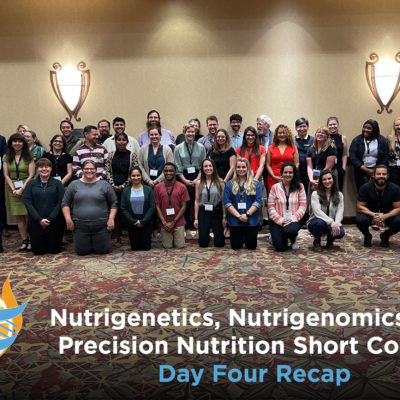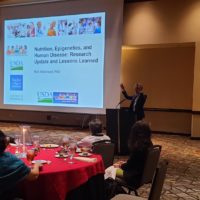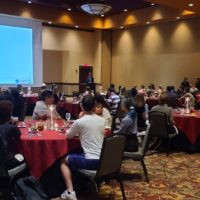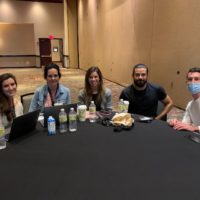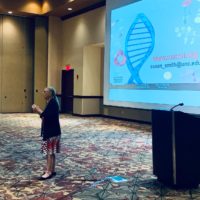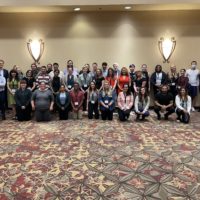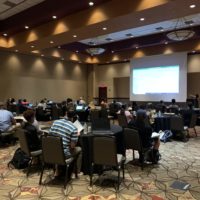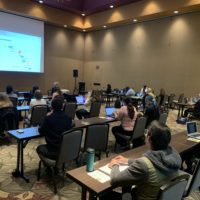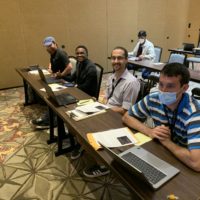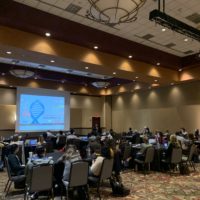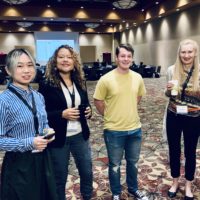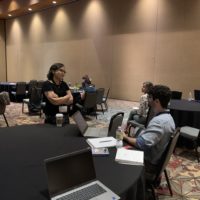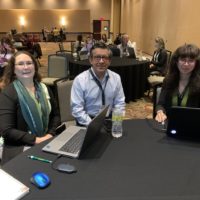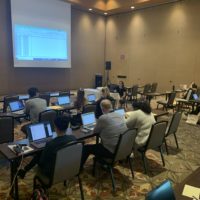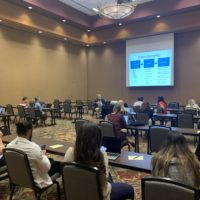The NRI presented its annual NGx short course May 16-19, in Concord, NC, for graduate students, health professionals, and nutrition scientists. See recaps of Days One, Two and Three.
The last day of the NGx course focused on childhood obesity, giving participants a view of how nutrigenetics, nutrigenomics and precision nutrition are being used practically to address specific health concerns.
Saroja Voruganti, PhD, associate professor, UNC Nutrition Research Institute, began the day’s themed presentations with an overview of childhood obesity. As of 2020, obesity prevalence is at a staggering 19.7 percent in children and adolescents ages 2 to 19 with more than 14 million children in the U.S. categorized as obese. The causes of childhood obesity are multiple and include behavior, family, community, and biology. Childhood obesity is a serious health problem and is linked to increased risk for metabolic diseases in adulthood. Nutrigenetic studies on childhood obesity are few and have largely focused on macronutrients (fat, protein, carbohydrate) that are required in large amounts in the diet. But there is considerably more to study in relation to obesity and nutrition. For effective personalized nutritional therapies, scientists must investigate gene-nutrient interactions thoroughly and early in life.
Margarita Teran-Garcia, PhD, assistant dean for integrated health disparities programs, University of Illinois Urbana-Champaign, presented “Nutrition and Epigenetics in Childhood Obesity.” Teran-Garcia began her talk addressing the STRONG (Synergistic Theory and Research on Obesity and Nutrition Group) Kids Program, which takes a comprehensive approach to studying obesity in children by considering the Six C’s: Cell, Child, Clan, Community, Country, and Culture.
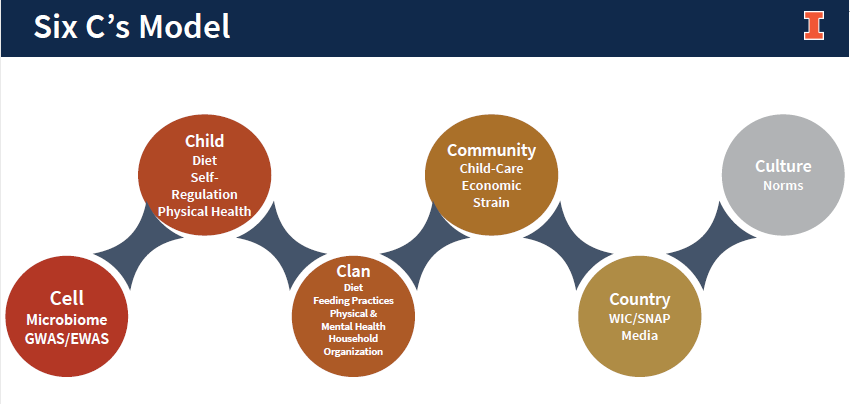
*Image from University of Illinois at Urbana-Champaign | Family Resiliency Center
Multifactorial causes of childhood obesity require multidisciplinary research and interventions led by a diverse team with expertise from cells to community and innovation to intervention. The STRONG Kids research team encompasses faculty ranging from food science and nutrition to kinesiology, social work, communications, and human development and family studies. Teran-Garcia also discussed how epigenetics impacts DNA methylation and its role in childhood obesity, stating, “Epigenetics is the key to personalized nutrition.”
Felipe Vadillo-Ortega, MD, PhD, professor at the School of Medicine, National Institute of Genomic Medicine (INMEGEN) in Mexico City, presented, “Biological and Social Determinants of Childhood Obesity.” He introduced his study, Obesity Increases Metabolic Syndrome Risk Factors in School-Aged Children from an Urban School in Mexico City, which found that childhood obesity prevalence is high in Mexico and it is having an influence on children’s health. Based on this study, scientists ran an intervention program that began with women when they were pregnant and then followed up with them and their children from newborn to five years. The study recruited 968 women who completed the program through the follow-up phase. The program looked at gestational weight gain, did a dietary recall and an evaluation of diet quality, and promoted exclusive breastfeeding in the first six months of life. You can read more about the program here.
The short course ended with Elizabeth Tejero, PhD, head of the Laboratory of Nutrigenetics and Nutrigenomics, INMEGEN, presenting, “Application of Nutrigenomics approaches to obesity prevention in children.” She began by identifying various genes associated with obesity. The most replicated variants associated with childhood and adolescent obesity are close to or harbored in the genes FTO, TMEM18, MC4R, FAIM2, NRXN3, FOX2P, ADCY3, SEC16B, TNNI3K, BDNF, and NEGR1. While there is a significant amount of research on the role of nutrients/diet on epigenetic mechanisms related to obesity, few studies have been conducted in children using a nutrigenetics or nutrigenomics approach. According to Tejero, “More research is required considering appropriate methods for obesity prevention and treatment in children.”
The fourth and last day of NGx demonstrated how the cutting-edge science employing nutrigenetics, nutrigenomics, and precision nutrition is being employed in studies to address a pressing public health concern – in this case, childhood obesity. The short course concluded with a luncheon and participants said farewell to each other after exchanging contact information for continued connection and hopes of collaboration.
Quotes from participants about NGx:
“Attending the nutrigenomics and nutrigenetics course was overall a great experience! I had the opportunity to learn new concepts with the rich content that was presented, meet other healthcare providers, and make connections. I am grateful for this great opportunity!”
– Jenny Gonzalez, Graduate Student, University of New England
“As a doctoral student, I felt this short course was extremely valuable and rewarding. Not only did I learn a tremendous amount, but I was able to connect and network with leaders in the field and forge relationships that will hopefully last for years to come.”
– Elizabeth Brandley, Doctoral Student, University of Illinois
“As someone recently entering the nutrition and nutrigenomics sphere, the conference was an invaluable primer to the world of nutrition and genetics and the vast relevance and reach of the field. Hearing from experts from both the NRI campus and outside universities as well as visiting the labs and seeing the cutting-edge tools firsthand expanded my view on how nutrigenomics can impact health. I now have many textbooks and articles to read before I attend the next one!”
– Carolyn Lis, MPH-RD Candidate, UNC Chapel Hill
The NGx short course educates current and future NGx researchers, provides cutting-edge research directions and methodologies in NGx, and brings together students, postdocs, faculty (basic scientists and translational researchers), industry researchers, and clinicians in an inclusive environment to foster interactions and networking.
- Participants from NGx, 2022

